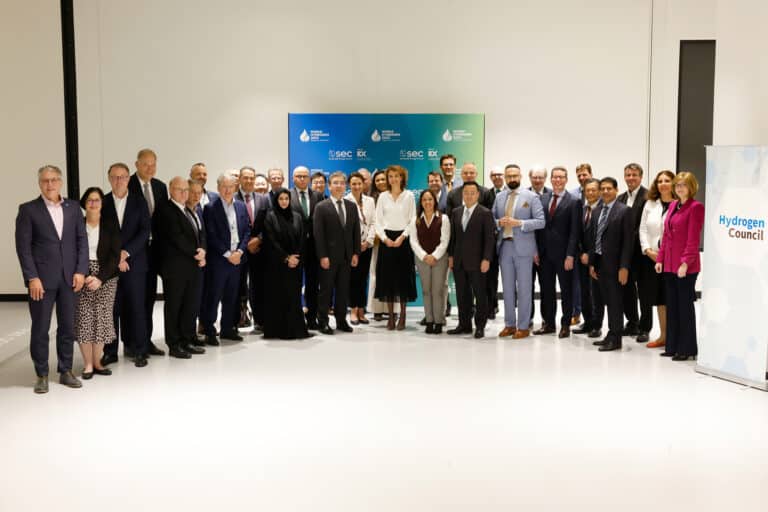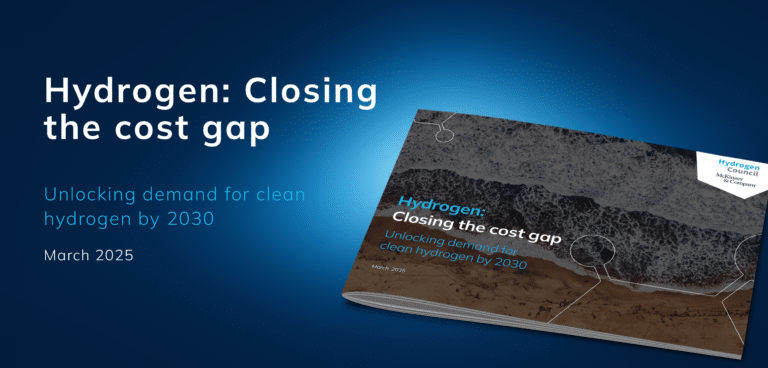Honda was one of 13 founding members of the Hydrogen Council when the global CEO-led initiative was created in 2017. What does it mean to Honda to be a founding member of the Council?
Leading the world in the development of fuel cells and FCEVs, Honda supports the aims of the establishment of the Hydrogen Council and has played an active part since its establishment, in an effort to accelerating creation of a hydrogen society toward attaining a carbon neutral society through cooperation with those who share the same vision.
Why did Honda want to be a part of the Hydrogen Council?
We have joined the Hydrogen Council as we believe that with other Council members we can share the intentions of the private-driven, hydrogen-related industry to the world, which makes it possible to have an impact on policies and investments.
We also expect that participation in the CEO meetings allows Honda to understand the current hydrogen-related global trend as well as exchange information and explore networking with top executives.
What’s Honda’s vision for the future of cars? And how does hydrogen fit into this?
Honda aims for “carbon neutrality in all our products and corporate activities by 2050.”
To achieve this, we aim to only sell BEVs and FCEVs (automobiles) worldwide by 2040.
Honda has over 30 years of history in hydrogen technology and FCEV development.
Fuel cell system development with GM is currently underway, and Honda is planning to sell FCEVs with this system onboard in North America and Japan in 2024.
What are some recent hydrogen highlights for Honda?
In view of the world’s environmental trends, we will help bring about a carbon neutral society by expanding our core technology, fuel cell technology, to various applications (commercial vehicles, stationary power stations, construction machinery, etc.) other than our FCEVs.
For commercial vehicles, we are collaboratively working with Isuzu and Dongfeng Motor respectively to research on fuel-cell trucks.
Also, a stationary power station, for which a fuel cell system for “CLARITY FUEL CELL” is reused, has been installed on the premise of Honda’s US subsidiary to examine possible future commercialization.
In Europe, an energy eco-system combining renewable energy, hydrogen production and hydrogen utilization is being built.
In addition to that, we have concluded a research and development contract with the Japan Aerospace Exploration Agency (JAXA) concerning a “circular renewable energy system” to supply power to lunar probe vehicles and are working on the research and development commissioned by JAXA.
With regards to hydrogen, what does Honda have planned for 2023?
As for commercial vehicles in Japan, a prototype of a fuel-cell heavy truck will be manufactured jointly with Isuzu, and a demonstration experiment of the test vehicle is planned in 2023. Furthermore, in China which has the largest market size for commercial vehicles, we have manufactured a fuel cell track with Dongfeng Motor Corporation and started the driving demonstration.
Also, a verification test of the stationary power station installed on the premise of our US subsidiary will be conducted. This test will verify the practicability by actually using the power supply as emergency power for a data center.
In Europe, we have decided to establish facilities for green hydrogen production and hydrogen refuelling at the R&D base in Offenbach, Germany. We expect that this investment will further strengthen our energy management systems and allow us to produce green hydrogen through electrolysis and use such hydrogen for FCEVs, by utilizing any surplus electricity from solar power. These hydrogen-related facilities will be introduced by an affiliated partner companies and be launched in the second half of this year.
Honda continues to aim at popularization of fuel cell systems in not only FCEVs but a wide range of applications, such as commercial vehicles, stationary power stations and construction machinery.
About The Hydrogen Council
The Hydrogen Council is a global CEO-led initiative that brings together leading companies with a united vision and long-term ambition for hydrogen to foster the clean energy transition. The Council believes that hydrogen has a key role to play in reaching our global decarbonization goals by helping to diversify energy sources worldwide, foster business and technological innovation as drivers for long-term economic growth, and decarbonize hard-to-abate sectors.
Using its global reach to promote collaboration between governments, industry and investors, the Council provides guidance on accelerating the deployment of hydrogen solutions around the world. It also acts as a business marketplace, bringing together a diverse group of 140+ companies based in 20+ countries across the entire hydrogen value chain, including large multinationals, innovative SMEs, and investors.
The Hydrogen Council also serves as a resource for safety standards and an interlocutor for the investment community, while identifying opportunities for regulatory advocacy in key geographies.
To find out more visit www.hydrogencouncil.com and follow us on Twitter @HydrogenCouncil and LinkedIn.
Joanna Sampson, Communications Manager, Hydrogen Council
joanna.sampson@hydrogencouncouncil.com



